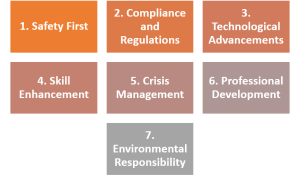The Importance of Training the Maritime Trainer
The maritime industry plays a pivotal role in global trade, commerce, and transportation, connecting nations and enabling the movement of goods across the world’s oceans. To ensure the safety, efficiency, and effectiveness of maritime operations, the training of maritime trainers holds significant importance. These trainers are responsible for imparting essential knowledge, skills, and best practices to seafarers, contributing directly to the industry’s overall success and sustainability.
The Importance of Training the Maritime Trainer
The maritime industry plays a pivotal role in global trade, commerce, and transportation, connecting nations and enabling the movement of goods across the world’s oceans. To ensure the safety, efficiency, and effectiveness of maritime operations, the training of maritime trainers holds significant importance. These trainers are responsible for imparting essential knowledge, skills, and best practices to seafarers, contributing directly to the industry’s overall success and sustainability.

The Importance of Training the Maritime Trainer
The maritime industry plays a pivotal role in global trade, commerce, and transportation, connecting nations and enabling the movement of goods across the world’s oceans. To ensure the safety, efficiency, and effectiveness of maritime operations, the training of maritime trainers holds significant importance. These trainers are responsible for imparting essential knowledge, skills, and best practices to seafarers, contributing directly to the industry’s overall success and sustainability.
- Safety First:
Safety is paramount in the maritime industry. Ships are complex machines that operate in challenging environments, and any error can lead to catastrophic consequences. Well-trained maritime trainers ensure that seafarers are equipped with the skills necessary to handle emergencies, navigate adverse weather conditions, and prevent accidents. Through comprehensive training, trainers instill a safety-first culture among seafarers, mitigating risks and enhancing the overall safety of maritime operations.
- Compliance and Regulations:
The maritime industry is subject to a multitude of international regulations and standards designed to safeguard the environment, ensure vessel integrity, and protect the rights and well-being of seafarers. Maritime trainers play a pivotal role in educating seafarers about these regulations, training them to operate in compliance with laws such as the International Maritime Organization’s (IMO) conventions and the International Labour Organization’s (ILO) Maritime Labour Convention. Adequate training ensures that seafarers understand and adhere to these regulations, contributing to ethical and lawful practices in the industry.
- Technological Advancements:
The maritime industry is undergoing rapid technological advancements, from automated systems and electronic navigation tools to data-driven decision-making processes. Training maritime trainers becomes crucial to keep seafarers updated with the latest technologies. Trainers help seafarers and managers develop proficiency in using these technologies effectively, ensuring smooth operations and reducing the risk of errors arising from unfamiliarity with advanced equipment.
Certificate in Training the Maritime Trainer
is designed to fulfil the requirement for the implementation of regulation I/ 6 of the STCW Convention concerning the qualifications of instructors. It also incorporates important elements of the IMO Model Course 6.09 (Training Course for Instructors) and elements of the IMO Model Course 1.30 (on-board assessment).
- Skill Enhancement:
Seafarers and managers require a diverse skill set to perform their duties effectively. Maritime trainers focus on honing skills such as navigation, cargo handling, maintenance, and communication. By identifying gaps in seafarers’ and manager’s skill levels, trainers can tailor training programs to address specific needs, thereby enhancing overall competence and job performance.
- Crisis Management:
In the maritime industry, crises can range from mechanical failures and medical emergencies to piracy threats and natural disasters. Training maritime trainers to simulate and train people ashore and onboard in crisis scenarios equips them with the ability to respond promptly and effectively. Through realistic training exercises, trainers help seafarers develop problem-solving skills, teamwork, and resilience in high-pressure situations.
- Professional Development:
Training within the maritime industry is not limited to initial qualifications. Continuous professional development is crucial for career advancement and adaptability to industry changes. Maritime trainers facilitate ongoing learning opportunities for shipping managers and seafares, ensuring that they stay up-to-date with the latest industry trends, regulations, and best practices. This contributes to the overall growth of seafarers’ careers and the industry as a whole.
- Environmental Responsibility:
As environmental concerns grow, the maritime industry is under increasing pressure to reduce its ecological footprint. Training maritime trainers to educate about environmentally friendly practices, such as fuel efficiency, waste management, and the prevention of marine pollution, is crucial in promoting sustainable maritime operations.
In conclusion, the importance of training maritime trainers cannot be overstated. These trainers serve as the bridge between theoretical knowledge and practical application, ensuring that people ashore and on board are well-prepared to navigate the challenges of the maritime industry safely, efficiently, and ethically. With the continuous evolution of the industry, the role of maritime trainers remains vital in shaping the future of maritime operations and maintaining global trade connectivity.
Check out the Certificate in Training the Maritime Trainer













